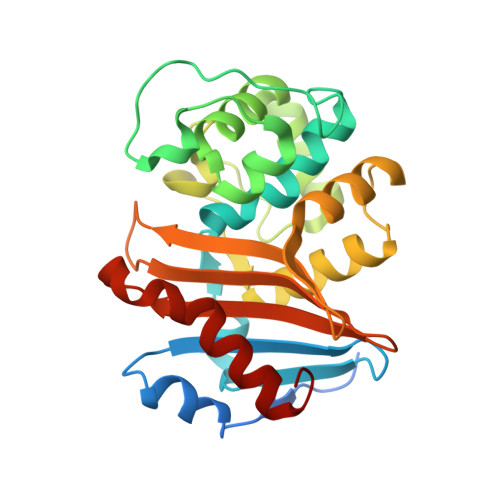The C5 alpha-Methyl-Substituted Carbapenem NA-1-157 Exhibits Potent Activity against Klebsiella spp. Isolates Producing OXA-48-Type Carbapenemases.
Smith, C.A., Stewart, N.K., Toth, M., Quan, P., Buynak, J.D., Vakulenko, S.B.(2023) ACS Infect Dis 9: 1123-1136
- PubMed: 37130087
- DOI: https://doi.org/10.1021/acsinfecdis.3c00059
- Primary Citation of Related Structures:
8FAJ - PubMed Abstract:
The wide spread of carbapenem-hydrolyzing β-lactamases in Gram-negative bacteria has diminished the utility of the last-resort carbapenem antibiotics, significantly narrowing the available therapeutic options. In the Enterobacteriaceae family, which includes many important clinical pathogens such as Klebsiella pneumoniae and Escherichia coli , production of class D β-lactamases from the OXA-48-type family constitutes the major mechanism of resistance to carbapenems. To address the public health threat posed by these enzymes, novel, effective therapeutics are urgently needed. Here, we report evaluation of a novel, C5α-methyl-substituted carbapenem, NA-1-157, and show that its MICs against bacteria producing OXA-48-type enzymes were reduced by 4- to 32-fold when compared to meropenem. When combined with commercial carbapenems, the potency of NA-1-157 was further enhanced, resulting in target potentiation concentrations ranging from 0.125 to 2 μg/mL. Kinetic studies demonstrated that the compound is poorly hydrolyzed by OXA-48, with a catalytic efficiency 30- to 50-fold lower than those of imipenem and meropenem. Acylation of OXA-48 by NA-1-157 was severely impaired, with a rate 10,000- to 36,000-fold slower when compared to the commercial carbapenems. Docking, molecular dynamics, and structural studies demonstrated that the presence of the C5α-methyl group in NA-1-157 creates steric clashes within the active site, leading to differences in the position and the hydrogen-bonding pattern of the compound, which are incompatible with efficient acylation. This study demonstrates that NA-1-157 is a promising novel carbapenem for treatment of infections caused by OXA-48-producing bacterial pathogens.
Organizational Affiliation:
Stanford Synchrotron Radiation Lightsource, Stanford University, Menlo Park, California 94025, United States.


















